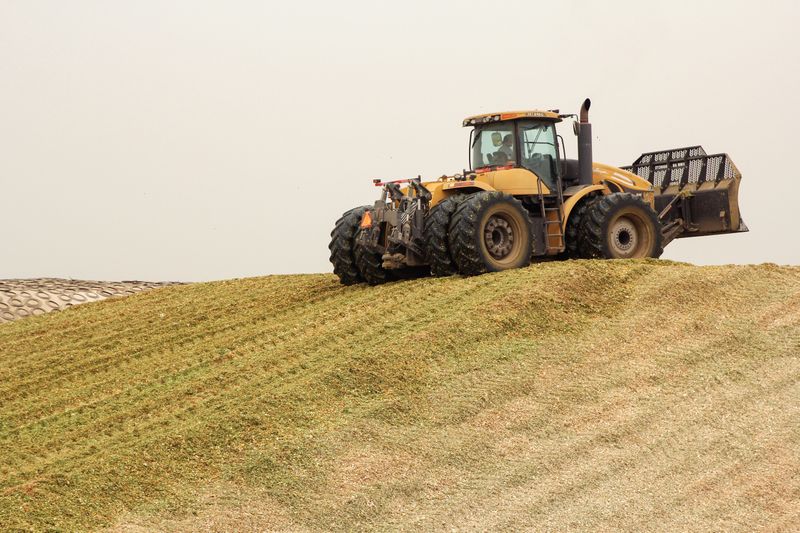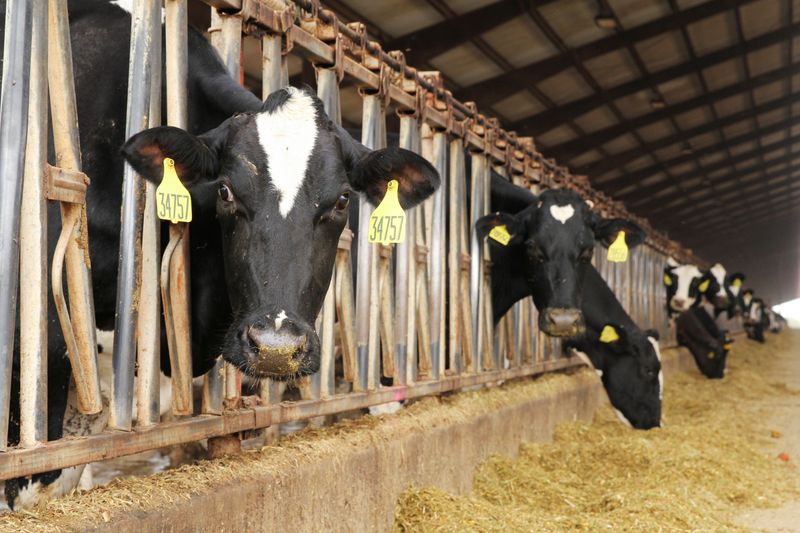By Rod Nickel
WINNIPEG, Manitoba (Reuters) - Looking to improve milk production, California farmer John Verwey turned to a Swiss-made feed additive designed to make a cow more efficient while reducing methane emissions from cattle burps.
The more a cow belches, the more it spends energy that could be used instead for milk production, Verwey reasoned. So two years ago, he started feeding his cattle Agolin, made of coriander, clove and carrot extracts, and replaced costlier additives that promoted weight gain.
He is still determining whether the change has affected milk output, but Verwey figures he has positioned himself for a world where consumers care more about greenhouse gas emissions from livestock.
"We think we're ahead of the curve," he said from Fresno, California. "Everyone should be trying their best to prevent pollution."
Major food companies are stepping into the space. Nestle SA (SIX:NESN) and chocolate producer Barry Callebaut have partnered with startup Agolin, while in July, Restaurant Brands International (NYSE:QSR) started serving burgers made from less gassy cattle at several U.S. Burger King restaurants.
Their plans hinge on farmers and the companies that buy the meat and milk they produce adopting cattle feed additives that inhibit gas. It is a tiny market that developers say is poised for multibillion-dollar sales.
The shift comes as meat and dairy industries face competition from substitutes for their products due to the perception they are healthier and less damaging to the environment.
Livestock emit 14.5% of the world's greenhouse gases that are related to human activity such as farming, according to the United Nations Food and Agriculture Organization. Nearly two-thirds of those emissions come from cattle, including through burps, flatulence and manure.
1 MILLION LOW-BURPING CATTLE
Ruminant animals like cattle produce methane as microbes ferment fibrous carbohydrates in their stomachs into digestible form.
Farmers feed Agolin to 1 million head of cattle in Europe, and another 250,000 head of American cattle, double its total sales volume five years ago, said Kurt Schaller, Agolin's managing director.
Feeding Agolin to some of the cows in Nestle's supply chain is one part of Nestle's net zero carbon commitment, said Robert Erhard, head of dairy sourcing for the maker of KitKat chocolate bars and Coffee-mate.
Generating more milk per cow reduces the animal's emissions on a per-liter basis, he said.
Barry Callebaut feeds Agolin to a "low single-digit" percentage of cows in its supply chain, said spokesman Frank Keidel.
Within two years, feed company DSM intends to launch sales in Europe, Australia, New Zealand and Latin America.
The global market for methane-inhibitor feeds could reach 1 billion to 2 billion euros ($1.18 billion to $2.37 billion) by 2030, said Mark van Nieuwland, director of DSM's "Clean Cow" program.
DSM is testing its Bovaer product with several food companies, including New Zealand dairy cooperative Fonterra Co-operative Group Ltd and Arla Foods Amba.
Mootral, another Swiss startup, plans to launch commercial sales in 2021, feeding 300,000 head of cattle, and adding at least another 1 million head by 2022, said Chief Executive Thomas Hafner.
To be sure, a few million cattle producing less methane would amount to a tiny fraction of the global 1.3 billion-head cattle herd.
"Agriculture, and food in general, it's not a very fast industry," Schaller said. "A new concept needs time."
While global sales of methane-reducing feed may amount to just $30 million in 2021, such sales may hit several billion dollars within five years, Hafner said.
"If (all feed suppliers combined) aren't in 50 million animals by 2025, we've done something very wrong," Hafner said.
Cattle methane-reducing efforts made headlines when Restaurant Brands began selling lower-methane Whoppers.
The pilot project is a bet that reduced cattle emissions will soon matter to consumers, said Matt Banton, Restaurant Brands' head of global innovation and sustainability.
"We're preparing for a future where that becomes a much bigger criteria."
The U.S. livestock sector has become more efficient and less emissions-intensive in recent years thanks to better use of feed and veterinary care and due to improved animal genetics, said Frank Mitloehner, professor of animal science at the University of California, Davis.
Mitloehner sees promise in feed solutions, but he sharply criticized Burger King's methane-reducing claims as premature and noted its marketing materials wrongly identified flatulence, rather than burps, as a major emission source.
Banton, of Restaurant Brands, agreed the company needs to do much more research.
Investors, however, are starting to pay attention to cattle methane emissions.
A Sarasin & Partners fund invests in DSM because of its efforts to help produce more sustainable food, such as through Bovaer, said Jeneiv Shah, global equity analyst at Sarasin.
FAIRR, a global investor network focused on risks with intensive animal farming, is concerned that strategies like Burger King's "simply aren't ambitious enough," said research manager Faazi Adam.
But feed makers hope to benefit from the attention to methane that the burger giant generated.
"It's positive that Burger King goes in this direction," Schaller of Agolin said. "It shows the need - and for me, competition is healthy."

($1 = 0.8442 euro)
